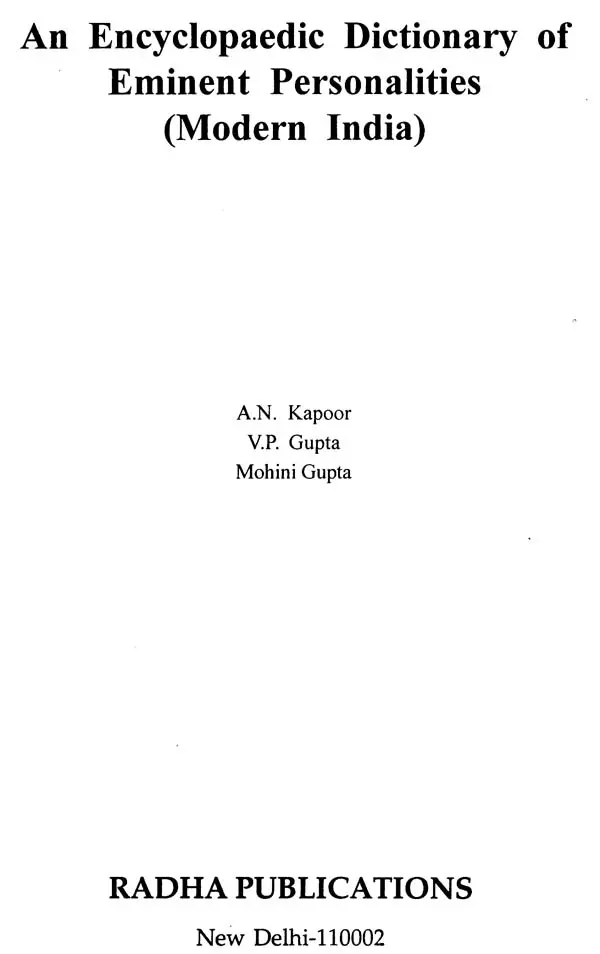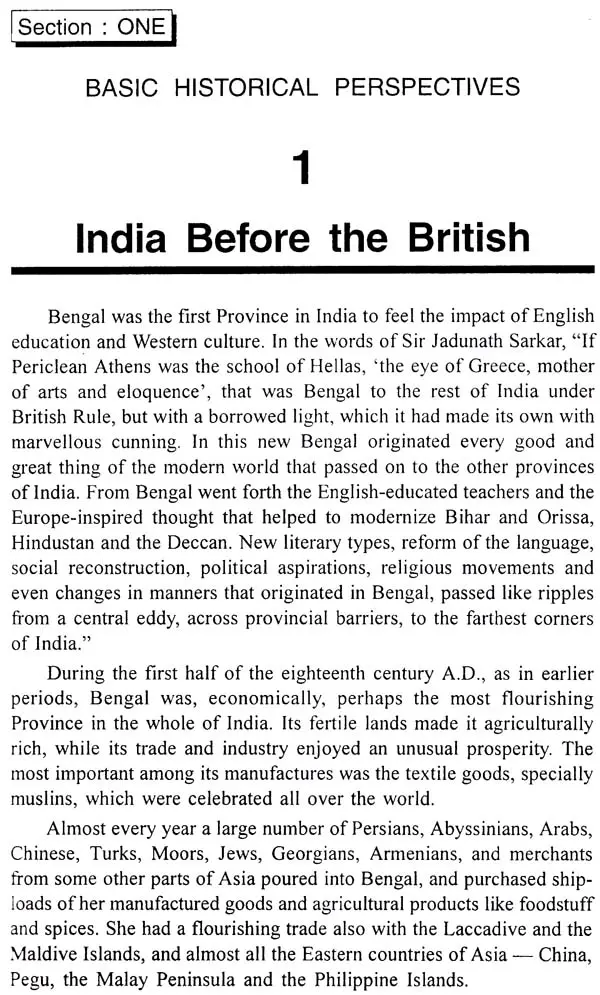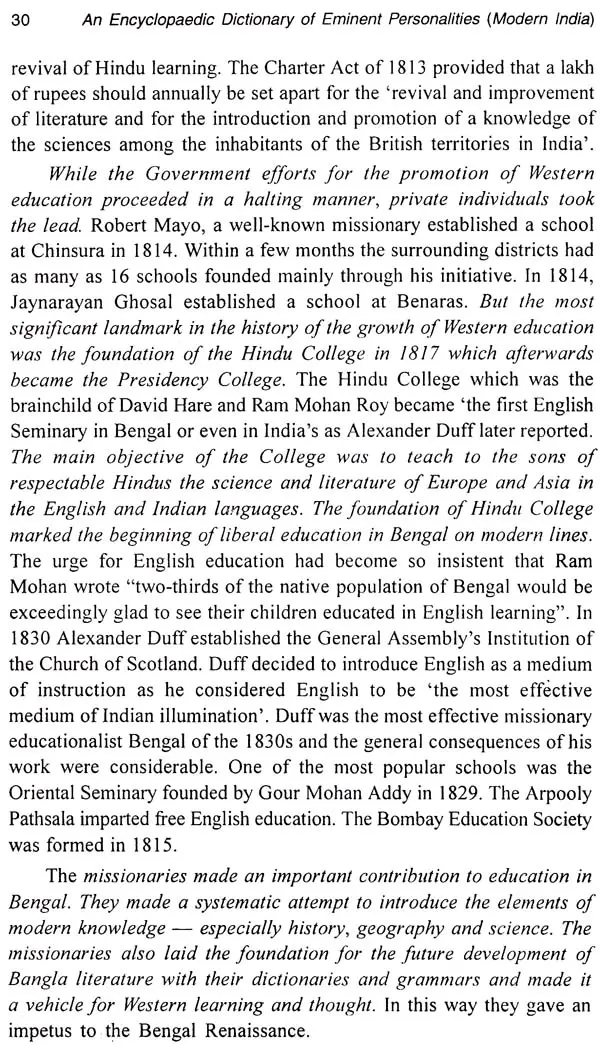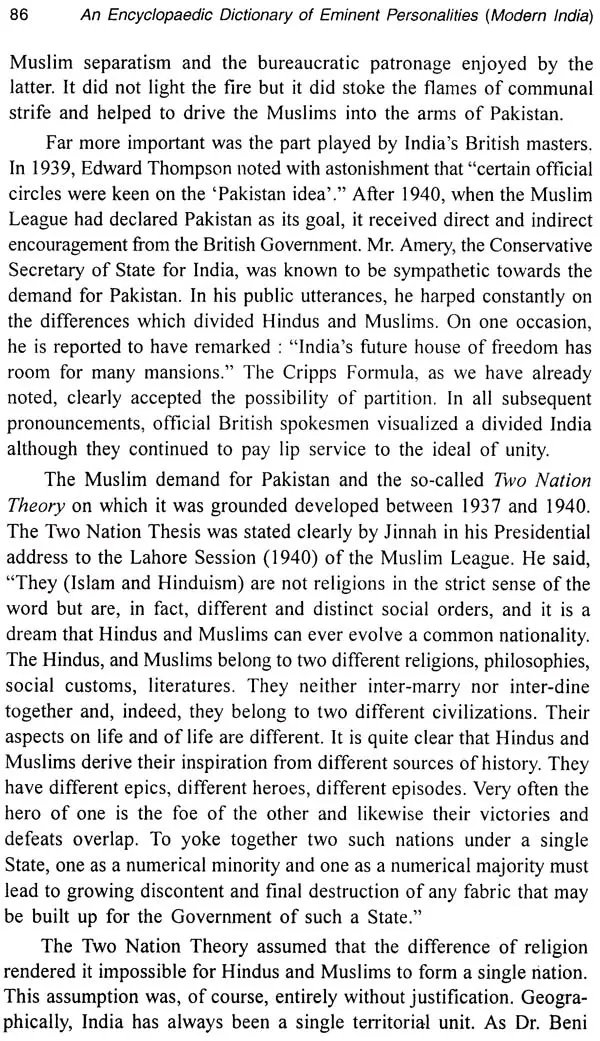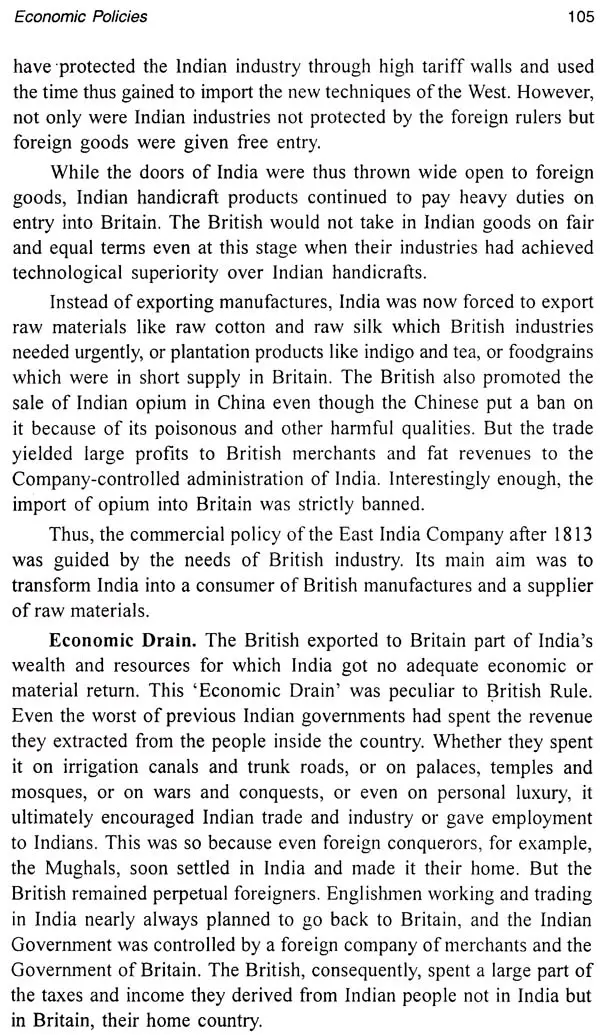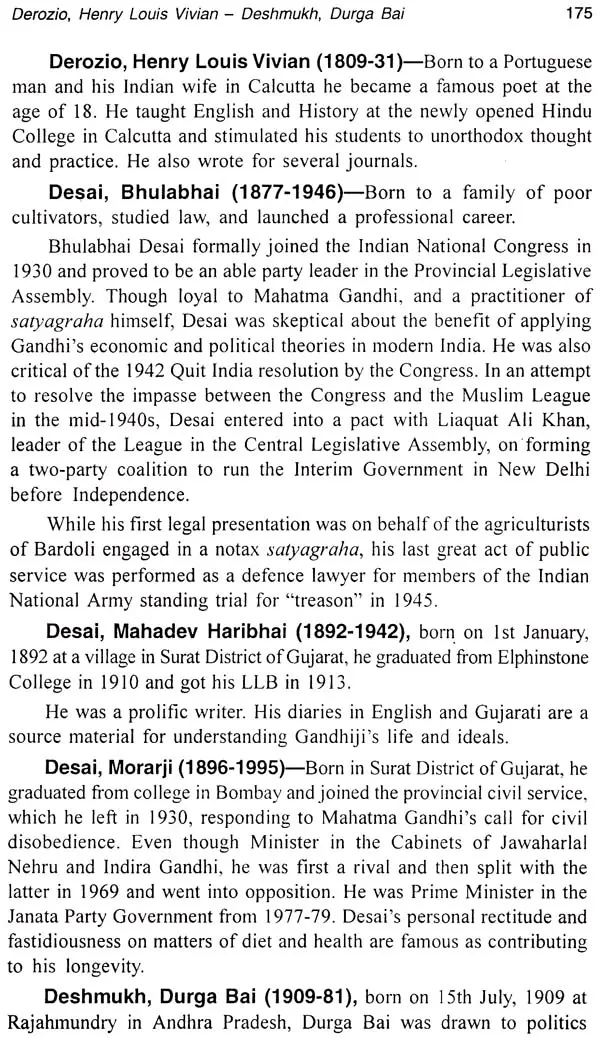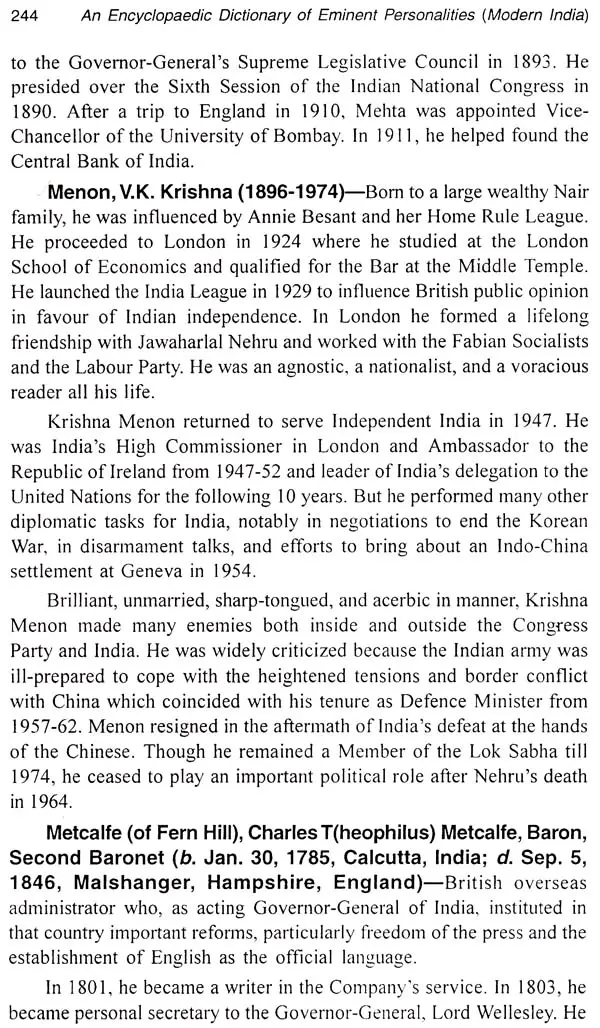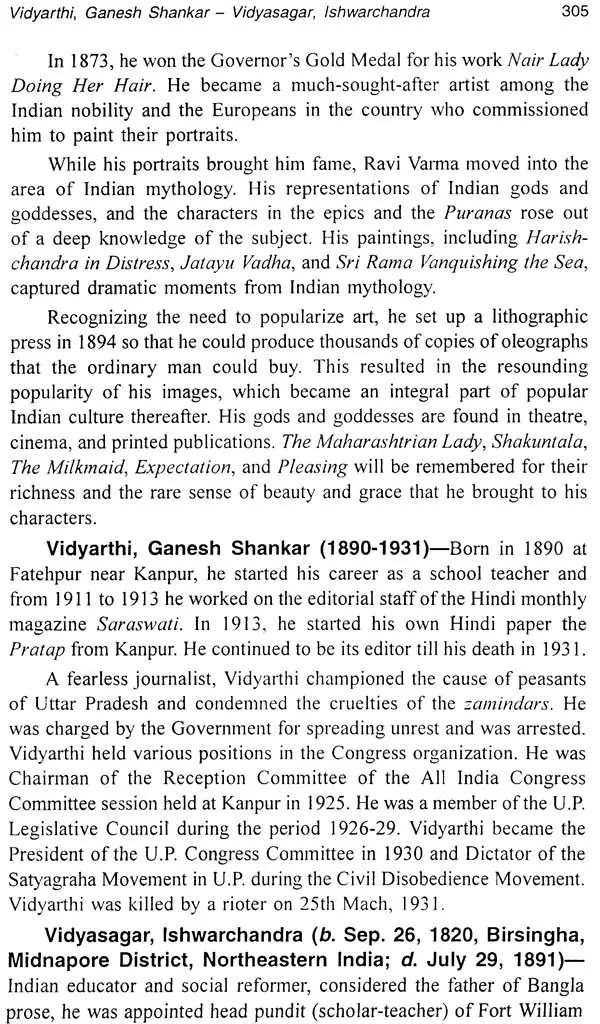
An Encyclopaedic Dictionary of Eminent Personalities (Modern India)
Book Specification
| Item Code: | UAL242 |
| Author: | A.N. Kapoor and V.P. Gupta and Mohini Gupta |
| Publisher: | Radha Publications, Delhi |
| Language: | English |
| Edition: | 2005 |
| ISBN: | 8174873856 |
| Pages: | 384 |
| Cover: | HARDCOVER |
| Other Details | 9.00 X 6.00 inch |
| Weight | 520 gm |
Book Description
The present Volume sketches the profiles of some 350 eminent personalities of modern India starting from the Battle of Plassey in 1757 and closing with the attainment of freedom in 1947. It is a period of about two centuries which witnessed the disintegration of the Mughal Empire and the rise of the British supremacy. The rivalries between the leading European trading companies, the infighting between the Indian rulers and the superior administrative and military skills of the British generals and policy-makers resulted in the subjugation of India. The period also saw the unfolding of administrative reforms and the far-reaching impact of the Western institutions and ideas on Indian people. The era is remarkable for a number of progressive trends including urbanization and growth of middle class, challenge of Christianity and new learning, recovery of the past, beginning of a new literature and press, development of transport and communication, evolution of national consciousness and constitutional changes culminating in the partition and independence of the country.
The men and women included in the Volume have been drawn from various fields like administration, freedom movement, literature, art and social and religious crusades. Sections devoted to Basic Historical Perspectives, Chronology and Bibliography are likely to be helpful for understanding the era as well as its architects.
A.N. Kapoor After obtaining M.A., D.Phil. in English from Allahabad University, Dr. Kapoor taught English at Agra and Delhi Universities for over four decades and has edited, compiled and authored more than hundred titles including reference books, encyclopaedias and language dictionaries. His dictionary of geographical terms published in 1955 was the first work of its kind in Hindi.
His comprehensive English-Hindi Dictionary stands as the crowning work of the four decade long effort. The lexicon is considered a work of tremendous relevance for the entire gamut of bilingual activity, being undertaken in the country as almost all levels of our social system, educational institutions and government departments.
V.P. Gupta: A former Professor at Delhi University, Chief Editor, Macmillan India and Deputy Director, Institute of Constitutional and Parliamentary Studies. V.P. Gupta is presently Secretary, Radha Kamal Mukerji Memorial Society. While he has been engaged in teaching, research and publishing activity for the last four decades, he has of late been concentrating on a study of Indian Freedom Movement, its ideas, events, personalities and forces which have laid the foundations of contemporary India along with all its triumphs and tragedies.
Mohini Gupta: A constant collaborator in the intellectual pursuits of her husband V.P. Gupta she is co-author in a number of his publications including an Encyclopaedia of History and Culture of Punjab, and biographical studies of Raja Rammohun Roy, Swami Dayanand Saraswati, Lokmanya Bal Gangadhar Tilak, Lala Lajpat Rai, Gopal Krishna Gokhale, Mahatma Gandhi, Sardar Vallabhbhai Patel and Dr. B.R. Ambedkar. A two volume study of India since independence critically examines the triumphs and tragedies of Indian people during the last fifty five years. These books brought out in both the languages English and Hindi-have been widely acclaimed as the harbinger of awareness about the ideals of our freedom struggle.
The present work An Encyclopaedic Dictionary of Eminent Personalities (Modern India) deals with the eminent personalities who shaped India during the British period stretching from 1757 to 1947. The period can be conveniently divided into two parts. The first part would cover the years from 1757 to 1857 and the second part extending from 1857 to 1947 would underline the growth of freedom movement. While the first part is mainly devoted to the consolidation of the British authority, the second part is the saga of struggle for freedom including its various phases such as liberalism, extremism, revolutionary activities and finally the Gandhian mass movements.
The period under review is significant from many points of view. It marked the disintegration of the Mughal Empire and the rise of the British power. The East India Company faced tough competition from the Portuguese, Dutch and French trading companies and was ultimately victorious. It was initially a commercial venture but in course of time developed political ambitions and was helped in its task of empire-building by the rivalries among the Indian rulers. The British rulers often took recourse to treason and treachery. The invaders subdued the Mughal, Maratha, Ruhela, Awadh (Oudh), Mysore, Nizam, Rajput and the Sikh kingdoms by sowing the seeds of dissension among them and following the time-tested Imperial dictum of "divide and rule". The Indian potentates miserably failed to gauge the dangers of the foreign enemies and succumbed to their superior manipulative, administrative and military capabilities. It is a sad commentary on Indian leadership that it lacked an all-India vision and could not think of presenting a united front.
**Contents and Sample Pages**
